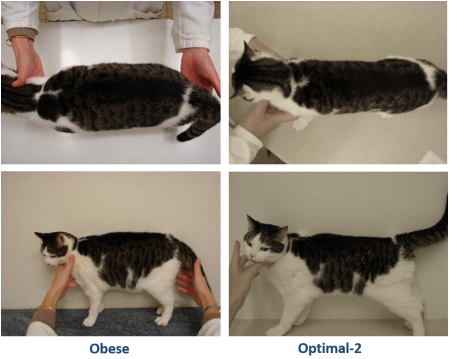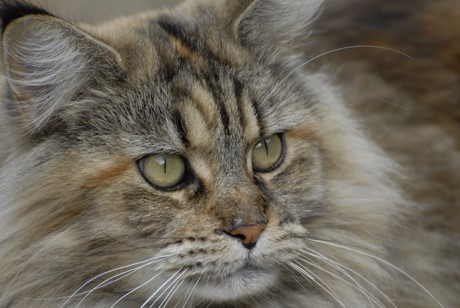Weight loss with a high-protein diet allows the recovery of optimal body composition and improves insulin sensitivity in obese cats

Introduction
Management of feline obesity is of the utmost importance because of its high prevalence and association with numerous diseases, such as diabetes mellitus. High-protein diets are preferable for cats, as obligatory carnivores; such diets are also often proposed in weight and diabetes management.
Animals, material and methods
Nine obese neutered adult cats (2.9±0.1 year old, mean BW 5.1±0.4 kg, BCS 8/9 (3 cats) or 9/9 (6 cats), mean overweight 46.0±4.0%) were included. They were fed the test diet (ME: 3190 kcal/kg DM, protein: 48% ME, fat: 29% ME, carbohydrate: 23% ME). The food allowance was adjusted every week for each cat to achieve weight loss between 1.5-2% per week.
Results
During the weight loss period, the mean energy allowance was 28 kcal/kg optimal BW. The mean duration to achieve the cats’ optimal BW (BW: 3.5±0.3 kg, BCS: 5/9) was 22 weeks, with a mean weight loss rate of 1.7% per week. Weight loss resulted in significant decrease of fat mass (FM: 0.9±0.1 kg vs 1.8±0.2 kg, p<0.001), and the final BC became optimal (%FFM/%FM: 74/26 vs 65/35) (Fig 1). The insulin sensitivity index was significantly higher after weight loss (0.07±0.01 vs 0.04±0.01, p<0.01) (Fig 2), and plasma leptin level was significantly lower (p<0.01).
Download the complete poster to see the table of results.
Discussion and Conclusion
Results indicate that cats effectively lost BW, mainly from the fat mass, and insulin sensitivity was improved. The BC improvement despite a rapid weight loss can be related to the high protein intake. Because low insulin sensitivity is a risk factor for diabetes in cats, its improvement is considered desirable. The observed improvement in insulin sensitivity could have resulted from weight loss itself as well as from the high-protein and lowcarbohydrate contents of the test diet, as it has been shown in other species.
Our results confirm that such a diet may be beneficial for the management of both obesity and diabetes mellitus in cats.
References: Colliard L et al. J Fel Med Surg 2009; 11: 135-140. Courcier EA et al. Vet Rec 2012; 171. Laflamme DP & Hannah SS. Intern J Appl Res Vet Med 2005; 3: 62-68. Frank G et al. Vet Ther 2001; 2(3): 238-246. des Courtis X et al. J Anim Physiol Anim Nutr 2015; 99: 474-482. Hoenig M et al. Am J Physiol Regul Integr Comp Physiol 2007; 292: R227-234. Stengel A et al. Am J Physiol Regul Integr Comp Physiol 2013; 305: R582-R591.


